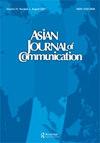躲在回音室里:印度WhatsApp的事实核查失败和准确性判定的个人策略
IF 1.5
2区 文学
Q2 COMMUNICATION
引用次数: 2
摘要
摘要在印度政治两极分化加剧的时期,通讯应用WhatsApp的使用量飙升。除了该应用程序的好处之外,还有一系列危险的结果,比如基于聊天的应用程序上的错误信息泛滥。为此,我们对40岁以上的WhatsApp印度用户进行了19次半结构化的深入采访。这项研究的目的是研究WhatsApp用户如何参与该平台以及他们通过该平台访问的内容,以便在本已分裂的时代通过政治两极分化进行调解。”我们的研究结果产生了三个总体主题:首先,参与者很少参与准确性确定策略。其次,他们对政治两极分化的内容表示熟悉,但声称不会参与其中。第三,他们对WhatsApp上未来有效的内容审核表示强烈希望。通过将培养理论应用于这些见解,我们考察了应用程序如何基于媒体社会化和真相效应为用户创造现实。我们参与者的见解和随后的分析挑战了许多科技公司和政府遏制错误信息的自上而下的方法。相反,我们提出了一种全面的方法,以更好地促进我们对错误信息生态系统的理解。本文章由计算机程序翻译,如有差异,请以英文原文为准。
Hiding in the echo chamber: fact-Checking failures and individual tactics of accuracy determination on WhatsApp in India
ABSTRACT During a time of heightened political polarization in India, use of the communication app WhatsApp skyrocketed. Alongside benefits of the app come a slew of dangerous outcomes, such as the proliferation of misinformation on the chat-based app. To this end, we conducted 19 semi-structured, in-depth interviews with Indian users of WhatsApp over the age of 40. The aim of study was to examine how WhatsApp users engage with the platform and the content they access through it in order to mediate through political polarization at an already divisive time.” Our results yielded three overarching themes: First, participants rarely engage in accuracy determination tactics. Second, they expressed familiarity with politically polarizing content but claimed not to engage with it. Third, they expressed intense hopes for future effective content moderation on WhatsApp. By applying cultivation theory to these insights, we examine how the app creates a reality for its users based on media socialization and the truth effect. Our participants’ insights and our subsequent analysis challenge the top-down-centric approach of many technology companies and governments to curb misinformation. We instead propose a holistic approach that better advances our understanding of the misinformation ecosystem.
求助全文
通过发布文献求助,成功后即可免费获取论文全文。
去求助
来源期刊

Asian Journal of Communication
COMMUNICATION-
CiteScore
3.70
自引率
0.00%
发文量
38
期刊介绍:
Launched in 1990, Asian Journal of Communication (AJC) is a refereed international publication that provides a venue for high-quality communication scholarship with an Asian focus and perspectives from the region. We aim to highlight research on the systems and processes of communication in the Asia-Pacific region and among Asian communities around the world to a wide international audience. It publishes articles that report empirical studies, develop communication theory, and enhance research methodology. AJC is accepted by and listed in the Social Science Citation Index (SSCI) published by Clarivate Analytics. The journal is housed editorially at the Wee Kim Wee School of Communication and Information at Nanyang Technological University in Singapore, jointly with the Asian Media Information and Communication Centre (AMIC).
 求助内容:
求助内容: 应助结果提醒方式:
应助结果提醒方式:


